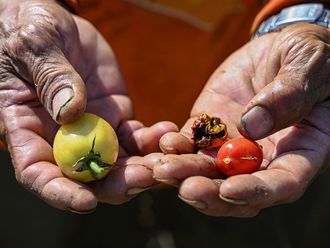Manila: Changes in global temperature could alter the eating habits of Filipinos, particularly their fondness for eating rice, a lawmaker warned citing findings of international experts.
According to Senator Loren Legarda, Chair of the Senate Committee on Climate Change, Filipinos’ love affair with the staple cereal could end eventually if they do not take necessary steps. “Filipinos are rice-loving citizens because that’s our staple food and we find it harder to resist eating rice than any other kind of food. Fast food chains and restaurants even offer unlimited rice to their customers, while some of our citizens can live with almost any dish as long as they pair it with rice,” she said.
Just as in most other Asian countries, rice is a standard fixture on every Filipino’s dining table, but Legarda warned they might find themselves with no other option but to turn to other staple foods as staple if authorities fail to address global warming concerns.
“The sad fact, however, is that our rice production is greatly affected by the warming climate. If we want to continue enjoying eating rice with our dishes, we have to do something to address the risks brought by climate change and the threat of further rise in global temperature,” she said.
Legarda cited findings of a 2009 study conducted by the Asian Development Bank that rice yield in the Philippines could decline by 75 per cent in 2100 with the lack of climate change adaptation programmes.
“We must not wait for the World Bank prediction of a four degrees Celsius temperature to happen before we begin to act because by that time it will already be too late. We have to adapt to the changing climate and double our efforts in reducing our greenhouse gas emissions as well as in urging other nations, especially the industrialised countries, to do the same,” she warned.
She pointed out that a scenario of rice disappearing from the Filipinos’ dining table is not impossible because typhoons, floods and droughts from 1970 to 1990 resulted in an 82.4 per cent loss in total Philippine rice production.
Currently, other international agencies are pitching in to help develop rice varieties that could survive the effects of climate change.
According to the International Rice Research Institute (IRRI), its experts have developed “Submarino rice” that has the ability to adapt to the effects of climate change, particularly prolonged immersion in water.
Submarino rice can survive being submerged in water for days, such as in situations when there is flooding.
For its part, the Department of Environment and Natural Resources (DENR) said it will continue to implement programmes geared towards the reduction of carbon emissions and climate change mitigation.
“Mitigating and adapting to climate change have long been inherent in the mandated functions of the DENR, more so since the country has been considered as one of the most vulnerable to its adverse effects,” DENR Secretary Ramon Paje said.
He pointed out that addressing climate change remains a top priority of the department considering that the Philippines is among the countries in the world most vulnerable to this global phenomenon.
Based on the 2013 Global Climate Risk Index, the Philippines ranks fourth among more than 190 countries that suffered the most extreme weather events such as flooding and storms over the past 20 years.












